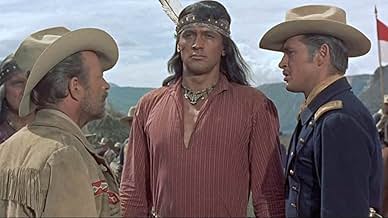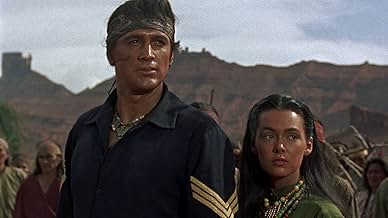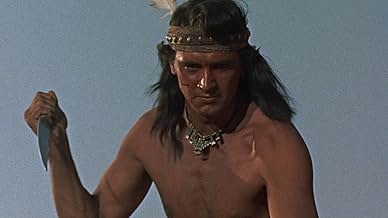IMDb RATING
5.6/10
1.1K
YOUR RATING
When peacemaking Apache chief Cochise dies, the Chiricahua Apaches are torn between following Cochise's peace loving son Taza and following the warlike renegade Apache warrior Geronimo.When peacemaking Apache chief Cochise dies, the Chiricahua Apaches are torn between following Cochise's peace loving son Taza and following the warlike renegade Apache warrior Geronimo.When peacemaking Apache chief Cochise dies, the Chiricahua Apaches are torn between following Cochise's peace loving son Taza and following the warlike renegade Apache warrior Geronimo.
Rex Reason
- Naiche
- (as Bart Roberts)
Eugene Iglesias
- Chato
- (as Gene Iglesias)
Richard H. Cutting
- Cy Hegan
- (as Richard Cutting)
Bradford Jackson
- Lt. Richards
- (as Brad Jackson)
Seth Bigman
- Indian Man
- (uncredited)
Featured reviews
This movie is well-famed and Rock Hudson looked great ( as he always did even to non-gay men). The long hair and darkened skin make him an awesome looking Indian. His Features are White but this was more often the case in Hollywood movies about Indians than roles of Indians played by real Indians. It is Ironic that Taza's son became an actor and acted in early westerns.. I learned this fact by IMDb. I shall use it in my future writing.
No-- It took 45 yrs to force Geronimo to Surrender and his legend is founded largely on the fact that he was never caught but due to many of his own warriors becoming scouts, he was forced to surrender. It is sad but in a very harsh way--just punishment that these scouts were stripped of their roles as Scouts and sent to the same prison where Geronimo was. They served much longer sentences than what they were given. This is yet another unfairness done to the APACHE and to Geronimo. Who died in his mid-eighties from alcoholism and from falling from his horse on the way home from a saloon. HE wound up in a irrigation ditch all night and caught pneumonia as a result and died shortly after. Not a fitting end for a man that could raise the back of the hair on many a settler and many a cavalry soldier who had to think about his chances of surviving a battle with him.
He almost beat the US army--but alcoholism is a disease that killed far more Indians than cavalry soldiers ever did. The Native American had NO time in their history to develop a resistance to the effects of alcohol---both the immediate effects and the long-term effects shortened the lives of most Native Americans who drank it.
In the much later movie GERONIMO starring Gene Hackman and Robert Duvall, the camera takes us on the long train ride to Florida in the end of the movie. Some Apaches who did not become traitors to Geronimo were being chastised by loyal warriors and Geronimo reminds them that they are so few that it would be good for them to learn to get a long- -he reminds them that all they have is each other.
Geronimo was a name that leaps off of the pages even now--- but in his lifetime-- anything written about him was read immediately because it was usually news about his ongoing exploits. It is very sad that they allow the mistake of saying that he was captured to be stated as truth among his own people. Because the fact that he was not captured or killed even though the forces used to find and arrest or kill him were massive, is a testimonial to the skill of the Apache and to Geronimo himself. I believe the final number that surrendered was under 100. However, I would not want to be a settler and live anywhere Near where that 100 Apache were running free. They were intelligent, skilled warriors and Geronimo has been called a tactical genius. Since he was NEVER captured-- that must be true.
I must clarify: I do not believe that Geronimo Was EVER actually Captured-- He did surrender twice and after the second surrender, he was sent to prison in Florida. He was treated with respect by white soldiers with high level rank and other Apache though that respect from White Generals did deteriorate, he was NEVER just dismissed by his peers. This movie shows that happening again and again. This is tragic for the Apache was never really conquered and to say that he was, cheats him of the truth. Entire Armies were sent against them but they were NOT actually beaten in the common sense of the word. IF I was an Apache-- I would want that fact to remain clear and would be angered by a sloppy screenplay from Hollywood that disputes the truth of the Apache's wartime accomplishments. They have never been equalled.
Warren E.Justice
No-- It took 45 yrs to force Geronimo to Surrender and his legend is founded largely on the fact that he was never caught but due to many of his own warriors becoming scouts, he was forced to surrender. It is sad but in a very harsh way--just punishment that these scouts were stripped of their roles as Scouts and sent to the same prison where Geronimo was. They served much longer sentences than what they were given. This is yet another unfairness done to the APACHE and to Geronimo. Who died in his mid-eighties from alcoholism and from falling from his horse on the way home from a saloon. HE wound up in a irrigation ditch all night and caught pneumonia as a result and died shortly after. Not a fitting end for a man that could raise the back of the hair on many a settler and many a cavalry soldier who had to think about his chances of surviving a battle with him.
He almost beat the US army--but alcoholism is a disease that killed far more Indians than cavalry soldiers ever did. The Native American had NO time in their history to develop a resistance to the effects of alcohol---both the immediate effects and the long-term effects shortened the lives of most Native Americans who drank it.
In the much later movie GERONIMO starring Gene Hackman and Robert Duvall, the camera takes us on the long train ride to Florida in the end of the movie. Some Apaches who did not become traitors to Geronimo were being chastised by loyal warriors and Geronimo reminds them that they are so few that it would be good for them to learn to get a long- -he reminds them that all they have is each other.
Geronimo was a name that leaps off of the pages even now--- but in his lifetime-- anything written about him was read immediately because it was usually news about his ongoing exploits. It is very sad that they allow the mistake of saying that he was captured to be stated as truth among his own people. Because the fact that he was not captured or killed even though the forces used to find and arrest or kill him were massive, is a testimonial to the skill of the Apache and to Geronimo himself. I believe the final number that surrendered was under 100. However, I would not want to be a settler and live anywhere Near where that 100 Apache were running free. They were intelligent, skilled warriors and Geronimo has been called a tactical genius. Since he was NEVER captured-- that must be true.
I must clarify: I do not believe that Geronimo Was EVER actually Captured-- He did surrender twice and after the second surrender, he was sent to prison in Florida. He was treated with respect by white soldiers with high level rank and other Apache though that respect from White Generals did deteriorate, he was NEVER just dismissed by his peers. This movie shows that happening again and again. This is tragic for the Apache was never really conquered and to say that he was, cheats him of the truth. Entire Armies were sent against them but they were NOT actually beaten in the common sense of the word. IF I was an Apache-- I would want that fact to remain clear and would be angered by a sloppy screenplay from Hollywood that disputes the truth of the Apache's wartime accomplishments. They have never been equalled.
Warren E.Justice
Beware folks, because you deal here with the only western that director Douglas Sirk will ever give to us. But he has for this western his fetish actor Rock Hudson, so he is not totally alone in unknown territory. This is an agreeable piece of work, not worse nor better than other Universal westerns of this period. George Sherman could have done it too, and in the very same manner. By chance, Jeff Chandler, who played Cochise in THE BROKEN ARROW - for Twentieth Century Fox - was in the meantime "transfered" to Universal Studios, so it was easy for the production to use him as a dying Cochise in the beginning. And this is not a spoiler !!!!! Rock Hudson is OK, it also could have been worse. Good western.
Maybe someone knows something more about this: I once read part of an interview with Rock Hudson in which he said that Taza, Son of Cochise was "one of the great tongue-in-cheek westerns of all time." He didn't pursue the pint, so I'm not sure what it is that's tongue-in-cheek about the film. However, Hudson did say that he and Sirk and company had a great time making it. I'd love to find a video of this seldom-seen film and check it out, but perhaps someone has an inkling?
Not all 3d movies are filmed having in mind that 3d technique requires specific camera movements and well adjusted settings to shine. But Douglas Sirk, a consumated director did not make that mistake. Just watch the opening sequence with an indian on a horse standing in front of the deep immensity of the canyon at Arches National Monument Park in 3d and glorious technicolor. Breathtaking.
The story -almost totally fictionized- turns pale before it but still is a nice entertainment. Jeff Chandler, who played Cochise in Broken Arrow and The battle at apache pass reprise the role uncredited at the beginning of the film, passing the leadership to his older son Taza. The story runs along to explain how indians are put aside in a reservation with many discontent trying to sublevate and others -guided by Taza- trying to preserve a peace difficult to mantain due to white man's rigid mentality. Imperative to watch it in 3d to enjoy the visual values of this film.
Jeff Chandler reprises his role as Cochise (in "Broken Arrow") and, in the first ten minutes, dies after instructing his youngest son, Hudson's Taza, to keep the Apaches on the path of peace. Taza's half brother Nache (Rex Reason), however, wants to slaughter all white eyes. Barbara Rush is the Apache princess torn between the two brothers. On location, brutal desert sun, despite body make up, severely burned Hudson, mostly shirtless to exhibit his physique. Film was shot and released in 3-D with expected effects of rocks, spears, and arrows flying from the screen. As a churning Western, the Apache POV places "Taza" in a group of early 50s Westerns, such as "Broken Arrow" (James Stewart) and "The Savage" (Charlton Heston), that sided with Indians and culminated in "Apache" (Burt Lancaster). Moral score card is reckoned by pairing white and Apache villains. With brisk direction, handsome cast (notably Rush and Reason), and Technicolor capturing expanses of red-orange desert, "Taza" is respectably good of its kind. In dealing with Indians vs. whites, "Taza" may be a bit cavalier, but tongue-in-cheek? No. Hudson here was only one stair tread away from achieving major stardom in "Magnificent Obsession"--and looks it.
Did you know
- TriviaDouglas Sirk often cited this film as the favorite of his own films since he always wanted to make a Western.
- GoofsThe official U.S. flag of 1872, the year the story takes place, did have 37 stars in five rows, however it consisted of a top and bottom row of eight stars with three rows of seven stars in between (8-7-7-7-8), not alternating rows of seven and eight (7-8-7-8-7) as the one in the film has.
- ConnectionsFeatured in Rock Hudson's Home Movies (1992)
- How long is Taza, Son of Cochise?Powered by Alexa
Details
- Release date
- Country of origin
- Languages
- Also known as
- Taza, Son of Cochise
- Filming locations
- Devils Garden, Arches National Park, Utah, USA(cavalry ambush scene)
- Production company
- See more company credits at IMDbPro
- Runtime1 hour 19 minutes
- Aspect ratio
- 2.00 : 1
Contribute to this page
Suggest an edit or add missing content




































